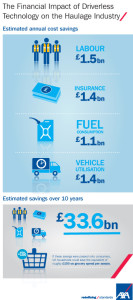Almost £34 billion could be saved if the UK logistics industry were using driverless vehicles, according to a new report by AXA UK and Douglas MacNeill.
The report, titled “The future of driverless haulage”, found that if these savings were passed onto consumers, this would equate to over half of a person’s weekly retail spending or almost one and a half weeks’ worth of groceries, the equivalent of roughly £150 savings on grocery spend per household.
The study also found that when considering the anticipated cost savings across four cost categories (labour, fuel, insurance and vehicle utilisation), there would be an estimated £33.6bn of savings – and potentially as high as £47.5bn – after ten years.
Savings would come in the following form:
- Labour savingswould arise as driverless vehicles reduce the need for drivers
- Fuel consumption savingswould arise because computer controlled vehicles drive in a more efficient manner than those driven by people
- Insurance savingswould arise if driverless vehicles proved less accident-prone and insurers are able to pass on the benefit to the haulage industry in the form of lower premiums and
- Vehicle utilisation savingswould stem from the fact that driverless vehicles would be free from the restrictions of driver working hours
As a result of these savings, the financial impact of introducing a significant number of driverless HGVs on the haulage industry will be between £19.5bn and £47.5bn over ten years, with total cost savings of £33.6bn over the ten year period being the base case assumption.
 David Williams, head of underwriting at AXA UK, said: “In commissioning this economic modelling, we wanted to discover the financial impacts of introducing driverless haulage fleets. The results confirmed our suspicion that automated freight will not only be much more efficient and make the roads safer for other users, it will also reduce the prices of the end products that we all buy.
David Williams, head of underwriting at AXA UK, said: “In commissioning this economic modelling, we wanted to discover the financial impacts of introducing driverless haulage fleets. The results confirmed our suspicion that automated freight will not only be much more efficient and make the roads safer for other users, it will also reduce the prices of the end products that we all buy.
“Autonomous vehicles can help reduce the needless number of lives lost through road traffic accidents caused by human error and assist in driving down fuel costs and consumption. HGVs alone were involved in 6,000 road accidents in 2013, comprising a total of 8,448 casualties, 258 of which were fatalities. These are preventable, human-error accidents and the introduction of driverless technology has the potential to transform the haulage industry, with significant implications for the UK’s roads, in terms of safety and congestion, for its environment, business and the UK economy as a whole.”






